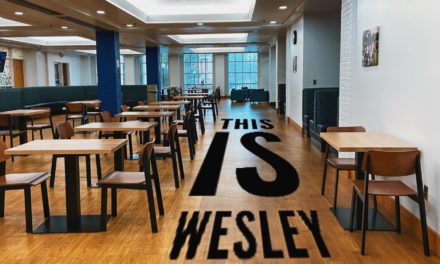Evan Le’Mon, The Whetstone
As I reflect back on my time here at Wesley, some of my fondest memories are with The Whetstone. Whether it was the feeling of, “This is going to be good,†during an interview, or the rush of finishing a heavy-hitting story, the work I did for the school paper definitely changed me for the better as a person and as a writer.
However, while the work I did for The Whetstone was some of my most rewarding, it was also some of my most frustrating. There were a lot of reasons for that frustration, but the brunt of it boils down to one sentence – people at this school don’t understand journalism.
The first thing I think people need to understand is that not everything is news. I don’t know how many times people have come up to me asking me to write a “good story†about their organization, or an event that they had coming up. This part didn’t bother me too much – being involved in several other big organizations on campus, I was used to taking requests.
The Whetstone is different, though. We are not running a PR firm. Our job isn’t to make Wesley or any person or organization associated with the college look good. Our job is to write fair, balanced articles, not “fluff pieces.†We’re here to cover the important issues on campus, whether the parties involved in said issues want us to or not.
That leads me to my biggest headache when it comes to writing for The Whetstone – people refusing to be interviewed. Picture this: you’ve got a great story that you’re ready to submit. All you need is one last person’s perspective to tie the whole thing together. But when you ask to interview them, they either don’t respond to your attempts to reach out or flat out tell you, “No.â€
I want to address both sides of the coin. To the people who are scared to go on record: none of your complaints about Wesley will ever change if no one is willing to talk about them. Whatever your problem is, I can guarantee you that you’re not alone. Once you use your voice, more people will have the courage to use theirs until the cry for change is so loud it can’t be ignored. That’s how things get done.
Now, to the people who don’t want what they did in the dark to come to the light – the jig will be up eventually. It’s inevitable. If The Whetstone is covering what happened, chances are it already is. Our purpose in trying to interview you isn’t to attack you, it’s to give you a chance to tell your side of the story. Our goal is always to be fair, but not every story we right can be “positive.†If something negative happens that’s newsworthy, it’s our duty to shine a light on it. If you don’t want to be highlighted in a negative light, the only advice I can give you is not to give us a reason to.
There’s nothing wrong with covering or highlighting positive things on campus, and we do. But if we didn’t cover the more controversial, commonly seen as “negative†topics, who else would? How else would students find out what’s really going on at the school? Part of our responsibility as journalists is to hold people accountable for their actions by putting the spotlight on them. That’s something we at The Whetstone take very seriously, and something I plan to continue to take seriously as I pursue a career in this field.




